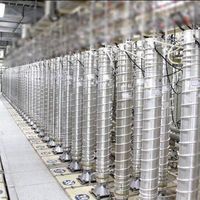Iran struggles to address significant setbacks faced by its Syrian ally
The Iranian foreign minister, reaffirming Tehran's unwavering support for the Syrian military, left Tehran for Damascus on Sunday as opposition forces intensify their offensive against Bashar al-Assad's troops in Syria.
“The Islamic Republic of Iran firmly supports the Syrian army and government,” Abbas Araghchi said during a Navy Day event in Tehran on Saturday, ahead of his visit to Damascus.
“We make no distinction between the Zionist regime and Takfiri terrorists,” he added, referring to Syria's Islamist rebels and denouncing what he described as destabilizing efforts by external actors in the region.
He also added that he is going to deliver Tehran’s message for the Syrian government during his trip.
The comments come as Syria experiences its most significant rebel advance in years. Hay'at Tahrir al-Sham (HTS), an Islamist militant group, is leading an offensive that captured large sections of Syria's second largest city, Aleppo, including its international airport according to their statement, and advanced into neighboring Hama province. This marked the most substantial territorial loss for the Assad government, which is backed by Iran and Russia.
In response, Syrian forces, supported by Russian airstrikes, launched a counteroffensive to regain control. The Russian defense ministry confirmed that its air force has been striking rebel positions, describing the situation as the boldest challenge to Syrian government forces in years.
Araghchi framed the conflict as part of a broader geopolitical struggle, alleging that the United States and Israel were aligned with militant groups in the region.
“The Takfiri terrorist forces are now standing alongside America,” he said, expressing confidence in the Syrian government’s ability to reclaim lost ground.
“The Syrian army will once again, as in the past, overcome these terrorist groups.”
The fall of Aleppo comes after years of Iranian support for Assad’s military, including financial aid, weapons, and personnel from the IRGC and allied militias such as Hezbollah. These forces have propped up the Syrian government in its efforts to reclaim territory since the civil war began in 2011. However, the latest rebel offensive has demonstrated the limits of Tehran’s capabilities that have weakened in recent months because of relentless Israel attacks against Hezbollah.
The fighting in Aleppo, which was firmly under government control since 2016, has disrupted years of relative calm in Syria’s civil war. Over 50 towns and villages fell to rebel forces, with reports of significant casualties among Syrian government troops, who retreated from several areas.
The developments have drawn international attention, with the White House National Security Council condemning the Assad government for its reliance on Iran and Russia.
Syria’s refusal to engage in a political process and its dependence on Iran and Russia “has created the conditions now unfolding, including the collapse of regime lines in northwest Syria,” said NSC spokesperson Sean Savett.
Meanwhile, the Syrian Democratic Forces (SDF), led by Kurdish groups and backed by the United States, expanded their control in parts of Aleppo as government forces withdrew. The conflict’s resurgence has reignited regional tensions, with its intersections in Gaza, Lebanon, and northwest Syria highlighting the broader geopolitical stakes.
Araghchi’s visit to Damascus forms part of Iran’s broader outreach to save the Assad government. Foreign Ministry spokesperson Esmail Baghaei on Saturday announced plans for Araghchi’s further meetings with Turkish officials after Damascus.
The renewed fighting signals a potential turning point in the 13-year Syrian civil war, as key players reassert their influence in the country’s fragmented political and military landscape.








